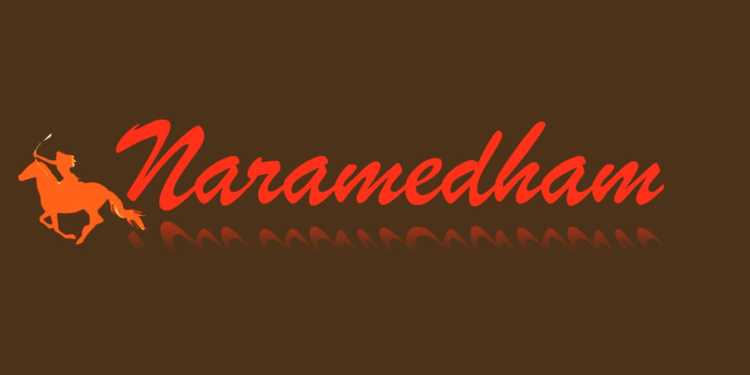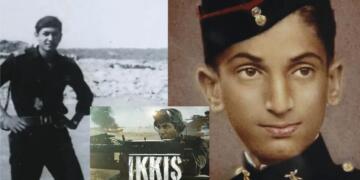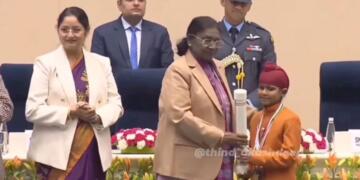About: This was a historic Novel written in Telugu by Malladi Vasundhara. She was a professor. Published in late seventies, this was part of curriculum for students of Intermediate.
I read it as a kid and the story impressed me so much, it remained in my memory. I tried to find a copy to read it again. Having read again, I felt an urge to translate it. I tried to contact the original author, in vain. Yet, I hope she would bless me for my effort. I strive to maintain the high standard she displayed in writing the original.
Introduction:
Even in the land of Karma, the philosophy is often interpreted to suit one’s requirements. While the lazy justify themselves blaming it on the destiny, the greedy say ‘One should do his job’ disregarding the results. Somewhere in between, the actual essence of the Karma philosophy is lost.
Naramedham means sacrificing a Human to appease the gods. Why a King, of all persons would sacrifice a human being to appease his god? Is he not sacrificing many soldiers in the wars he embarks upon? What more can a King ask for even after attaining all the glories that are achievable in the physical world? To whom he was proving and what he was proving by killing an innocent in the name of the God?
Does God like humans killing one another, especially in his name? How does a God react if a human kills a fellow human? It is said in the scriptures of India, irrespective of the intention, the bad deeds would result only in bad future. And, the work of destiny in this regards may be slow but is sure. The result of a bad deed that is normally called ‘sin’ not only affects the perpetrator but even the next generations.
Like many stories of ancient India, this story too deals with the principles of acceptable social norms. The story though, is set in not so ancient India.
When Vishnukundina dynasty ruled Andhra, it was the golden period for the kingdom. They were staunch followers of Vedic rituals. It is said that one King named Madhava Varma performed one Yajna called Naramedham that involved human sacrifice.
How the Human sacrifice affected Madava Varma, the greatest of Kings, is the story…
Chapter 1 : Yajna Sthalam (Sacrificial Altar)
Invoking the God in the form of Rudra:
आपाताळनभ:स्थलान्तभुवनब्रह्माण्डमाविस्फ़ुर
ज्ज्योतिस्फ़टिकलिङ्गमौळिविलसत्पूर्णेन्दुवान्ताम्रुतै: ।
अस्तोकाप्लुतंएकम्ईश्ंअनीशंरुद्रअनुवाकान्जपन्
ध्यायेत्ईप्सितसिद्ध्येध्रुवपदंविप्रअभिषितसेवितम्॥
From the depths of nethers that may exist to the Sky, entire Universe is being sprayed with the flashing moonlight that was sitting on the head of Rudra, who was in the form of a Crystal Linga. In that moonlight, thoroughly bathed is the One, who is the Lord of the Universe and is the Ubiquitous One that is Rudra, who is the Universe himself. He sits there out in the cold and is served by the learned ones, who chant his name repeatedly requesting him to grant their wish to achieve a permanent state and relieve them of this provisional state of being restricted to a physical body. This state is called Nirvana while living and attaining Moksha once the physical body is dumped so it can merge into the five basic elements of the universe.
ब्रह्माण्डव्यप्तदेहाभसितहिमरुचआभासमाना भुजङ्गै:
कण्ठेकालाकलितशशिकळा: चण्डकोदण्डहस्ता:
त्र्यक्षारुद्राक्षभूषाप्रणतभयहरामूर्तिभेदा।
रुद्रा: श्रीरुद्रप्रकटितविभवान: प्रयच्छ्न्तुसौख्यम्॥
His body encompasses entire Universe. The ash he put on him was sparkling like snow. The snake around his neck covered entire sky. His neck was black. The crescent blossomed out of his braided hair. In his hands is the cruel bow. He has three eyes and wore a garland of Rosary beads. He kills fear in the minds of those who prayed to him. His snow white body is – different. He is Rudra, the form of God praying to whom makes one fearless.
The resonating voices of ten thousand proficient priests praying to the God in the form of Rudra in pitches alternating between high and low covering all seven notes of music have created and perforated entire space with amplifying sound waves. Listening to such musical prayers, the river Krishnaveni that got its name due to its resemblance to the beautiful, long braided dark hair of a woman was bristling with joy and joined the divine music by the tinkling sounds its waves made on the banks.
The sky was clear as good monsoon season had washed away all clouds – bright and dark. In the plains below the mountain on which the Goddess Kanaka Durga resides, many tents made by camping pilgrims shone in gold reminding the golden peaks of Himalayas. True, the visitors there were, were not there as tourists but as pilgrims. Elongated and elevated platforms made of Palm leaves decorated with strings of dark green mango leaves reminded the sanctity of the occasion and of the place. On the other side were scores of bathrooms, eateries many, stores where merchandise for Yajna are available were lined as long as the flowing river could be seen.
The busy morning had a cacophony mixed with sounds made by one and all. Neighing horses joined chorus with trumpeting elephants, sending shivers down the spines of the onlookers. On the other hand, sacrificial lambs emanated tragic bleats wrenching the hearts. Many turned their heads to watch young maids running down the streets as their anklets made twinkling sounds.
Tents on the grounds were of varying sizes and in various colours. Each had a flag indicating the kingdom of the guests residing in it and all flags fluttered in the morning breeze. Primary guests were the Kings of Kadamba, Vakataka, Gupta and Pallava realms. Secondary were those who were their vassals. Then there were businessmen who could buy some of the kingdoms if they wished so.
There were many tents that belonged to well-known citizens of Vijayavatika, many of whom were relatives of the King and his officials, who were the organizer of the Yajna. Of all these, two tents attracted the attention of a new visitor. One of them hosted the revered King Madhava Varma himself. The other one was of his Prime Minister Sri Pinaka Bhattaraka, who doubled as his high priest. The flag on the tent of the King had an image of a ferocious lion, representing the ferociousness of local deity Kanaka Durga.
Kings of Vishnukundina dynasty opted for “the King of Forest” to be on their flags. And as their state emblem, lions were printed on the coins minted by them. The ferocious Lion represented their character and psychology. They were all highly courageous and ferocious in the battlefield. They were known for helping the needy, for upholding the sacred scriptures and performing various sacrifices. Some of them even conducted Yajnas like Rajasuya and Aswamedha too. They enjoyed establishing the ancient Dharma and sustaining it. They prayed to Lord Shiva six times a day. They were blessed by the Lord Shiva residing at Sri Sailam in the form of Sri Mallikharjuna, along with Bhramaramba. His blessings made Vishnukundina Kings rule all cities, villages, forests and mountains in the southern plains and plateau.
During their rule, Andhra regions had prospered. It was golden time for people speaking Telugu as well as for the language itself. Andhra Kings were a nightmare to other rulers of neighbouring kingdoms. Some of neighbouring kings had genuinely adored the valour of Vishnukundina Kings. Some feared their valour. However, all tried to establish matrimonial relations with them so as to avoid wars with the mighty rulers of Vijayavatika. With no wars, peace prevailed in all realms.
Stories about valour and courage of Vishnukundina Kings were repeated for generations with great enthusiasm. Kings who lost to the valour of them offered hands of their daughters and thus entered into relation with them. Even Madhava Varma got his bride in one such endeavour. Chandragupta, father of Chandravathi Devi was impressed by the courage of Madhava Varma. Chandravathi Devi became the queen of Andhra Empire.
And then…
(To be continued)



























